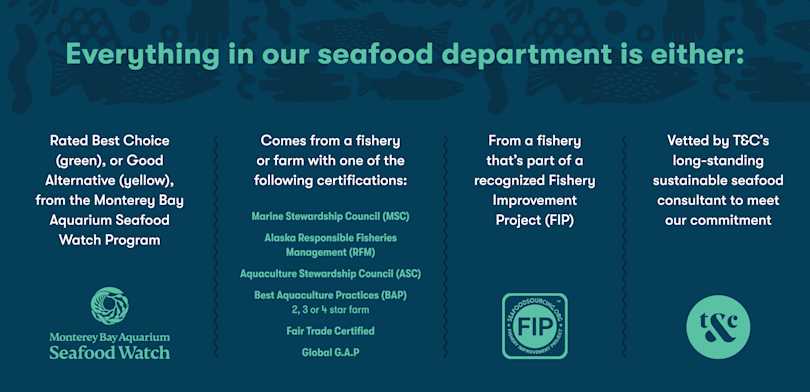At Town & Country Markets, our dedication to quality seafood runs deep. We’re committed to responsible sourcing because we care about our impact on the planet—and how it will feed future generations. We continually evaluate our seafood to ensure it comes from well-managed fisheries and farms that support resilient fish populations, sustain healthy ecosystems, and support fishing communities. We build strong relationships with our vendor partners to maintain clear visibility into how they operate.
Yes, we’re super picky about sustainable seafood.
Our seafood markets, delis, Field House restaurants, and Maka Sushi counters follow the Monterey Bay Aquarium’s Seafood Watch recommendations, or source from fisheries and farms with third-party certifications that meet rigorous sustainable seafood standards.
We’re continually assessing the fisheries and farms we work with against our rigorous internal standards—and we consult with industry experts to ensure that they reflect industry best practices for responsible sourcing.
And on the rare occasion a fishery is not certified or recommended by Monterey Bay Seafood Watch, we use guidance from our consultant so we can bring our guests great products from a trusted vendor we know or support the fishing community in other ways.
Our seafood is always sustainably sourced.

Why aquaculture's got a seat at our table.
Farmed seafood is essential to meeting the growing global demand for seafood, while supporting wild stocks. Done right, aquaculture is an important source of sustainable, high-quality seafood. That’s why at T&C we source farmed seafood from responsible farms that either have third-party sustainability certifications or follow the Monterey Bay Aquarium’s Seafood Watch recommendations.
This way, we know they align with our commitment to responsible sourcing, and with the industry’s highest standards for environmental and social responsibility, animal welfare, and food safety. We can assure you that the farms we work with have practices in place to respect the safety of wild populations and biodiversity.
Our Fishmonger Training Program.
 In 2024, the state of Washington launched a new Fishmonger Apprentice Program to help aspiring seafood professionals create career pathways and develop their skills. And guess who collaborated on it with them? We did. From the 144-hour classroom curriculum to the 2000 hours of on-the-job training, T&C’s skilled and knowledgeable fishmongers were instrumental in mapping out a rigorous program that covers product and species knowledge, seasonality, cutting, shucking, peeling and cracking techniques, food safety, business skills, interpersonal skills, and of course, every aspect of seafood sustainability.
In 2024, the state of Washington launched a new Fishmonger Apprentice Program to help aspiring seafood professionals create career pathways and develop their skills. And guess who collaborated on it with them? We did. From the 144-hour classroom curriculum to the 2000 hours of on-the-job training, T&C’s skilled and knowledgeable fishmongers were instrumental in mapping out a rigorous program that covers product and species knowledge, seasonality, cutting, shucking, peeling and cracking techniques, food safety, business skills, interpersonal skills, and of course, every aspect of seafood sustainability.The program’s first cohort was filled entirely with our seafood department team members. Now an officially registered union journeyman fishmonger, graduate William Mitchell talks excitedly about his career possibilities, and about the program itself.
“As a Union fishmonger, you can get job security. You can go wherever you like in the world with that. It also offers higher wages, and an overall increase of knowledge in everything that you do,” he says.
We’re thrilled to be able to promote our own people through the program, and to support our local community by providing a great career choice for anyone from foodies to nature lovers to people who just love the ocean.
And soon, we’ll be able to hire new grads from the program, knowing that they’re 100% prepared to meet the super-high standards our seafood departments maintain.
Partners we love.
T&C has a long-standing partnership with Ocean Beauty Seafood, and this distributor has been key to the success of our sustainable seafood program, by always meeting our T&C standards. Owned in part by the Bristol Bay Economic Development Corporation (BBEDC), they promote economic development opportunities for Alaskan communities through sustainable management of Bering Sea resources.
This multi-generational family-owned Puget Sound company is focused on growing healthy and sustainable clams and oysters now and into the future, using holistic farming practices, and advocating for stringent water quality policies in the area—for your ongoing dining pleasure as well as for the ongoing health of our environment.
Creative Salmon raises organic, non-GMO, salmon with no growth hormones or antibiotics. Their low-density environment gives fish more than twice the space to move and grow than a conventional farm would.
With their innovative practices, Kvarøy is out to transform the salmon farming industry, protect the seas, and bring the great taste and health benefits of salmon to the world. They let their pens lie fallow 3 times longer than required—to keep the area as clean as possible. They feed their salmon naturally fermented microalgae, which enhances the wild fish population. They use no antibiotics, and their production process enables a lower carbon footprint than even organic salmon.
Want to learn more about seafood sustainability? Dive deeper with these resources:
These taste even better with our ocean-friendly seafood:
Baked Cod with Fennel and Yukon Gold Potatoes